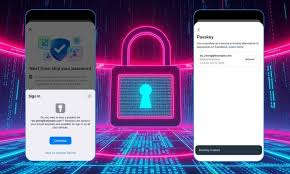CONTACT US
info@bidaiondo.com

You'll never need a password to log into Facebook again. Get ready to use passkeys.

123456, 1245, 1111, 0000, password… These are some of the most common passwords in the world (and therefore some of the most insecure). You've probably used them at some point, whether to activate your phone, access your email, or log into your social media account. Maybe even Facebook. However, in recent years, we've seen signs that the era of traditional passwords is coming to an end, and the social network with the most users in the world has decided to contribute a small-to-enormous contribution. Passkeys, the new way to access Facebook Meta has announced an important step toward improving the privacy and security of its users by introducing passkeys to Facebook for mobile devices. Passkeys are a new way to log in and verify your identity, offering a more secure and easy-to-use alternative to traditional passwords. This new feature, which will be available soon for iOS and Android devices, promises to streamline the login process while protecting user accounts from potential threats. In this way, Facebook follows in the footsteps of other digital giants that previously took this step, such as Google in 2023. What are passkeys? Passkeys are secure digital credentials designed to replace traditional passwords. They allow users to log in to apps and websites using their fingerprint, facial recognition, or mobile device PIN, rather than relying on passwords that are easy to guess or steal. This new form of authentication not only simplifies the login process but also improves security by resisting common attacks like phishing or password spraying. As Facebook explains, "Once you have a passkey, you won't have to type your password to access your Facebook account. You can also do things like autofill your payment information." Oh, and very importantly: once you set up a passkey for Facebook, it will also work on Messenger, which will receive this functionality in the coming months. In any case, Meta assures that users can still use traditional authentication methods, such as passwords, for devices that don't yet support passkeys. Why are passkeys more secure than passwords? Traditional passwords have long been one of the biggest vulnerabilities in the digital ecosystem, affected by phishing attacks or data breaches. Passkeys solve this problem by offering stronger authentication methods. Unlike passwords, which can be easily hacked or guessed, passkeys can't be stolen or obtained in the same way. This makes them a much more secure option, offering greater protection against phishing, password spraying attacks, and other online threats. Additionally, and this is very important, passkeys and the biometric data used to generate them, such as fingerprints or facial scans, are stored locally on your device, ensuring that Meta doesn't see or store them. How to set up your passkey on Facebook Facebook reminds its users that setting up a passkey is simple and only takes a few steps. You can manage your passkey in the Account Center, accessible from the Settings menu on Facebook. If you haven't set up a passkey yet, you'll be prompted to do so the next time you log in: The passkey you create on Facebook will use the email address you confirmed as your name, or your phone number if your email isn't available. Facebook assures that "we may ask you to create a passkey on your device when we need to confirm it's you," for example, when you log in to Facebook or when you autofill your payment information. The passcode is verified using the same fingerprint, face scan, or passcode you use to unlock your device. If you delete a passcode, you'll revert to alternative authentication methods, such as a password, in places where you've used it.
Last news
Google presenta la nueva “búsqueda fluida”: cuando la frontera entre AI Mode y AI Overviews se desvanece.

Meta supera los 3.500 millones de usuarios activos diarios en sus plataformas (+7%).

online trading systems.
 We show you the best way to market products and services online, through a professional service of installation, management and maintenance of your virtual store
We show you the best way to market products and services online, through a professional service of installation, management and maintenance of your virtual store
We program to suit you
 We help you achieve operational excellence in all your business processes, whether they are production, logistics, service or office processes. In addition, we assure you to maintain continuous improvement in your management.
We help you achieve operational excellence in all your business processes, whether they are production, logistics, service or office processes. In addition, we assure you to maintain continuous improvement in your management.
Bidaiondo Articles
What are strict account settings and why will your WhatsApp chats be (even more) secure now?

WhatsApp has announced the launch of a new update that will make your experience on the app more secure: Strict Account Settings. This feature is a direct response to the sophistication of current cyberattacks, which, although infrequent, represent a real threat to high-risk profiles such as journalists, public figures, and company executives. This launch comes just as the platform has been accused of allowing Meta to read WhatsApp chats. What ar...
Omnicom integrates TWBA and DDB into a single brand: this is what this advertising giant will be like.

Omnicom Advertising Spain has announced the integration of two of its flagship brands, DDB and TBWA, into a single entity that will operate under the TBWA Spain brand, self-described as “The Disruption Company.” This move is the first major development in the Spanish market following the global merger between the giants Omnicom Group and IPG Group, completed last November, which created the world’s largest media holding company....

ABOUT US
FILES

Welcome to Bidaiondo, dear user
BIDAIONDO SL, as the party responsible for the website www.bidaiondo.com, uses its own operating cookies and those of third parties of an analytical nature to allow the use of the website, analyze our services and show you information related to your preferences based on a profile drawn up from of your browsing habits (for example: pages visited). Please bear in mind that, if you do not activate some types of cookies, such as operational and analytical cookies, your experience of using this website may be affected. You can obtain more information and configure your preferences in the CONFIGURE option that appears below, you can reject cookies in the REJECT AND CLOSE option or accept all cookies and continue browsing in the ACCEPT AND CLOSE option.
So do you want to know more?
Data privacy seems important to you, and it is to us too. We store cookie data for 13 months. If you want to know more, you can visit our pages Privacy Policy y Cookies policy. Do you know what cookies are? Cookies are files that are used by virtually all websites. When browsing our page, they are installed in your browser or device to ensure that the website works correctly and store information about your visit. The data provided by cookies treat the user anonymously and in no case do they store personal information.
The data collected by the cookies we use are:
- Addresses IP
- References of visited pages
- References of downloaded files
- The website itself www.bidaiondo.com
- https://www.moz.com
- https://secure/europeanssl.eu

 Spanish
Spanish













